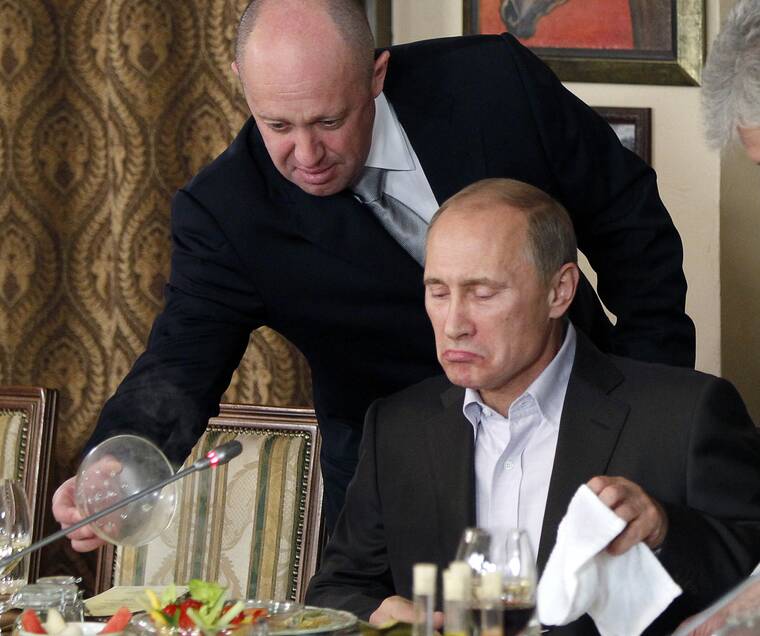Wagner leader, mutineer, ‘Putin’s chef’: The many sides of Yevgeny Prigozhin


ASSOCIATED PRESS / 2011
Yevgeny Prigozhin, top, serves food to then-Russian Prime Minister Vladimir Putin at Prigozhin’s restaurant outside Moscow, Russia, on Nov. 11, 2011. Prigozhin made his name as the profane and brutal mercenary boss who mounted an armed rebellion that was the most severe and shocking challenge to Russian President Vladimir Putin’s rule.


Yevgeny Prigozhin’s fate has been entwined with the Kremlin for decades — as a trusted government contractor, and the head of the Wagner mercenary army that fought in Ukraine and has been blamed for doing Russia’s dirty work in Syria and Africa.
But when he turned his men toward Moscow two months ago, many inside Russia and beyond started wondering just how long he could last after drawing the fury of Russian President Vladimir Putin.
Prigozhin cut a deal with Putin and the leader of Belarus for a safe haven for himself and the men involved in the rebellion. He was reported to pop up periodically in Russia, and appeared in a recruitment video earlier this week.
But then on Wednesday Russia’s civil aviation agency said he was aboard a plane that crashed north of Moscow, killing all 10 people on board.
PRIGOZHIN’S BACKGROUND
Prigozhin was convicted of robbery and assault in 1981, and sentenced to 12 years in prison. When he got out, he opened a restaurant business in St. Petersburg in the 1990s. Putin was the city’s deputy mayor at the time.
Don't miss out on what's happening!
Stay in touch with breaking news, as it happens, conveniently in your email inbox. It's FREE!
Prigozhin used that connection to develop a catering business and won lucrative Russian government contracts that earned him the nickname “Putin’s chef.” He later expanded into other areas, including media and an infamous internet “troll factory” that led to his indictment in the U.S. for meddling in the 2016 presidential election.
Wagner was first seen in action in eastern Ukraine soon after a separatist conflict erupted there in April 2014, in the weeks following Russia’s annexation of Ukraine’s Crimean Peninsula. At the time, Russia denied sending its own weapons and troops despite ample evidence to the contrary. The private Wagner army gave Moscow a degree of deniability.
Wagner personnel also deployed to Syria, where Russia supported President Bashar Assad’s government in a civil war. In Libya, they fought alongside forces of commander Khalifa Hifter. The group has also operated in the Central African Republic and Mali.
But it wasn’t until September 2022 that Prigozhin acknowledged founding, leading and financing Wagner. By then, his mercenaries — including men he’d recruited in Russian prisons — were fighting and dying by scores in Ukraine, especially in the shattered town of Bakhmut.
REPUTATION FOR RUTHLESSNESS
Prigozhin fostered Wagner’s reputation for ruthlessness, and the mercenaries have been accused by Western countries and U.N. experts of human rights abuses throughout Africa, including in Central African Republic, Libya and Mali.
A 2017 online video showed a group of armed people, reportedly Wagner contractors, torturing a Syrian and beating him to death with a sledgehammer before mutilating and burning his body.
In 2022, another video showed a former Wagner contractor beaten to death with a sledgehammer after he allegedly fled to the Ukrainian side and was repatriated.
Despite public outrage and demands for investigations, the Kremlin repeatedly turned a blind eye.
WAGNER’S ROLE IN UKRAINE
Wagner took an increasingly visible role in the Ukraine war as regular Russian troops suffered heavy attrition and lost territory in humiliating setbacks.
Prigozhin toured Russian prisons to recruit fighters, promising pardons if they survived a half-year tour of front line duty with Wagner.
In the interview in May, he claimed to have recruited 50,000 convicts, with about 35,000 men on the front lines at all times. He has also said he had lost more than 20,000 men — half of them convicts — in the battle for Bakhmut.
The U.S. has estimated Wagner had about 50,000 personnel fighting in Ukraine, including 10,000 contractors and 40,000 convicts.
POKING THE BEAR
Prigozhin claimed full credit in January for capturing the Donetsk region salt mining town of Soledar in Ukraine, and he accused the Russian Defense Ministry of trying to steal Wagner’s glory. He repeatedly complained the Russian military failed to supply Wagner with sufficient ammunition to capture Bakhmut and threatened to pull out his men.
After the capture of Soldear, Prigozhin increasingly raised his public profile, for months boasting almost daily about Wagner’s purported victories, sardonically mocking his enemies and complaining in profanity-laced diatribes about the military brass.
On June 23, he called for an armed uprising against the defense minister and headed from Ukraine toward Moscow with his mercenaries. His forces took control of the military headquarters in Rostov-on-Don, the city in southern Russia near the border with Ukraine, and continued their “march of justice,” until stopping a mere 200 kilometers (120 miles) from the Russian capital.
Putin branded Prigozhin a traitor as the revolt unfolded. But the criminal case against the mercenary chief on rebellion charges was later dropped. Unusually, the Kremlin said Putin had a three-hour meeting with Prigozhin and Wagner Group commanders days after the rebellion.
Some number of Wagner mercenaries headed to Belarus, but the fate of both Prigozhin and his force remained unclear.
U.S. President Joe Biden recently suggested Prigozhin was a marked man.
“If I were he, I’d be careful what I ate. I’d keep my eye on my menu,” Biden said last month.
But the man who made his first fortune as a caterer was undaunted in his latest appearance on Monday, telling would-be Wagner recruits his organization was “making Russia even greater on all continents.”



